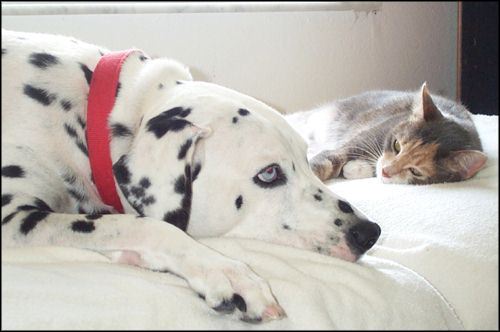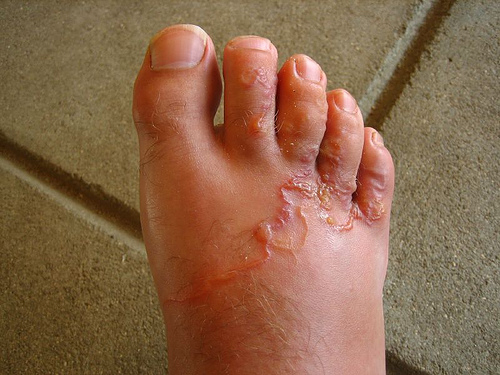General Comments
about Vaccination Programs
I don't have much to say as an introduction other than to state the obvious;
THANK GOD FOR THE VACCINES WE HAVE AVAILABLE TODAY !
Alarmists are making a big deal these days about the dangers and potential problems caused by vaccines ... and indeed, we, as a profession are making changes and improvements to both the vaccines themselves and to the protocols we recommend for pet vaccination.
But remember to keep some perspective; for every pet that experiences the discomfort of minor vaccine side effects, and yes, for the rare pet that experiences a major vaccine complication such as a cancerous reaction at the vaccine site or even allergic death: hundreds or thousands of pet lives are spared an agonizing death due to distemper, parvo, leukemia, feline AIDs, pneumonia, kidney failure, and rabies.
A Quick Comment or Two about Vaccine Quality
First, let me remind you that even high quality vaccines won't give your pet good protection if your pet is immune suppressed from parasites, certain medications, illness, certain metabolic problems such as diabetes, Thyroid problems, or Cushing's Disease, excessive stress, or poor nutrition.
That's why it's important to have a veterinarian give your pet it's vaccinations. Vets are trained to look for underlying problems.
In fact, there are several reasons this is a job for a good veterinarian as opposed to doing them in some parking lot, feed store, or doing them yourselves:
1. The most important part is a good history, wellness examination, and whatever blood, fecal, or heart tests are appropriate to make sure we're vaccinating a healthy pet. Only a vet working from a well equipped office can do this well.
2. Vaccine protocols used to be simple; we more or less recommended all pets to get vaccinations once a year. This system worked extremely well, all things considered, but now it's recommended that we fine tune this simplistic system and customize a vaccine protocol for each individual pet based on the pet's life stage, risk of exposure, health status, and so forth. This is, indeed, better for the individual pet, but it's more complicated, and ideally you get the advice of your veterinarian when deciding which vaccines are vital, which are probably a good idea, and which are not likely to be needed on a yearly basis.
3. Not all vaccines are equal in protecting your pet. And not all vaccines are equal in safety. Some older and less expensive brands are not only not as effective as the newer, improved vaccines, but are much more likely to cause local inflammation, irritation, and vaccine reactions. Some vaccines are nearly useless. Vets are constantly updated on vaccine improvements and vaccine problems and use the best and safest vaccines. This is not always the case if you're getting your vaccines from a mail order catalog, from feed stores, or parking lot clinics.
4. Vaccines have to be kept refrigerated, something that mail order houses, and feed stores may not be as meticulous about as veterinarians who tend to be very meticulous about vaccine and medication storage and handling.
5. While serious side effects and fatal allergic reactions are rare, it's fairly common to have minor allergic reactions, post vaccine fevers, and so forth. Veterinarians know how to deal with such problems.
6. And finally, reputable vaccine manufactures bend over backwards by paying vet bills and so forth on those occasions when their products caused trouble. They take even the smallest reported reaction seriously. But they only do so if the vaccines were administered under the supervision of a veterinarian.
About the Argument that We may be Vaccinating Pets More Frequently Than We Need
Basically, this argument is valid. Many healthy pets, especially in their middle years, probably don't need all vaccines every year. And the new thinking is that the immune system would react better to the different vaccinations spread out instead of all at one visit and that while serious vaccine reactions are pretty rare, why give a vaccine that has even a small potential for harm if it's not really needed.
While this argument is valid and while many, if not most vets are adapting their vaccine recommendations to conform to this thinking, it's sure made things more complicated.
Not that complicated though. It's just that from a lot of testing on animals, we know that the difference in disease protection that a particular vaccine provides is huge from one pet to another. In some pets, a feline leukemia booster will give adequate protection for several years, while in others for less than a year.
And the difference in length of good immunity provided for some diseases ...such as kennel cough, lepto, Lymes, and the feline respiratory viruses are probably less than a year, while for other diseases such as feline or canine distemper and hepatitis is probably good for several years or more.
So, it's become the job of the vet, along with the pet owner to decide which vaccines we should give. And this decision should be based on the age of the pet, the likely risk and exposure of the pet, and especially the health status of the pet.
Click here to go to our actual Preventive Wellness Exam and vaccine recommendations for:
We're All God's
Creatures
On This Page
Intro and General Comments
Some Comments About Vaccine Quality
Big Changes in our Vaccination Recommendations
On Other Pages
What I Recommend To My Dog Clients for their Pets at different Life Stages:
A new Vaccine 2007 for the prevention of gum disease is now available:
The Porphyromonas Denticanis-Gulae-Salivosa Bacterin is approved for the vaccination of healthy dogs as an aid in preventing periodontitis, as demonstrated by a reduction in bone changes (osteolysis/osteosclerosis).
Porphyromonas Denticanis-Gulae-Salivosa Bacterin is the first and only vaccine to aid in the prevention of canine periodontitis which affects 85% of dogs over 3 years of age.1
This product is an important new adjunct to professional dental cleaning, periodontal therapy and owner-administrated dental care routines.
The Porphyromonas Vaccine is part of a complete canine wellness program that encourages annual visits.
Safety of the vaccine was evaluated in laboratory studies and a field safety study.
"Go Forth and Preach....and if you must; use words."
St Francis
On Other Pages on this Site
Arthritis: treatment options and what to expect when you go to the vet
Coccidia; a protozoan parasite causing diarrhea and other problems in puppies and kittens
Giardia; an amoebic parasite causing diarrhea, nausea, and other problems in pets
Heartworms; a parasite spread by mosquitos that causes severe heart, vascular, and respiratory disease in dogs, cats, and maybe humans.
Denistry: why oral hygiene and health is so important and what you can do about it
Orthopedics: How I treat arthritis, pannus, hip dysplasia, and other problems of the bones and joints
Metabolic Diseases like Diabetes, Cushings Disease, Addison's Disease, and Thyroid Disease
History of Veterinary Medicine in the United States
Our Wildlife Pages about what to do when you find a wild baby rabbit, bird, or squirrel. Links to major wild life sites and a very funny story about beavers
Laboratory: Interpetating the Results of the lab tests we recommend in a lot of cases
Kennel Cough, Distemper, Rabies, Hepatitis, Leptospirosis, Parvo,
Panleukopenia, and Brucellosis








